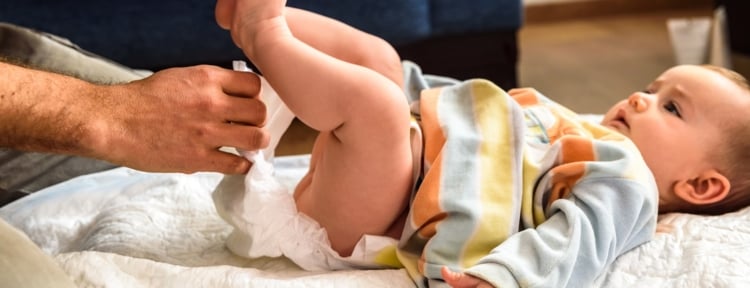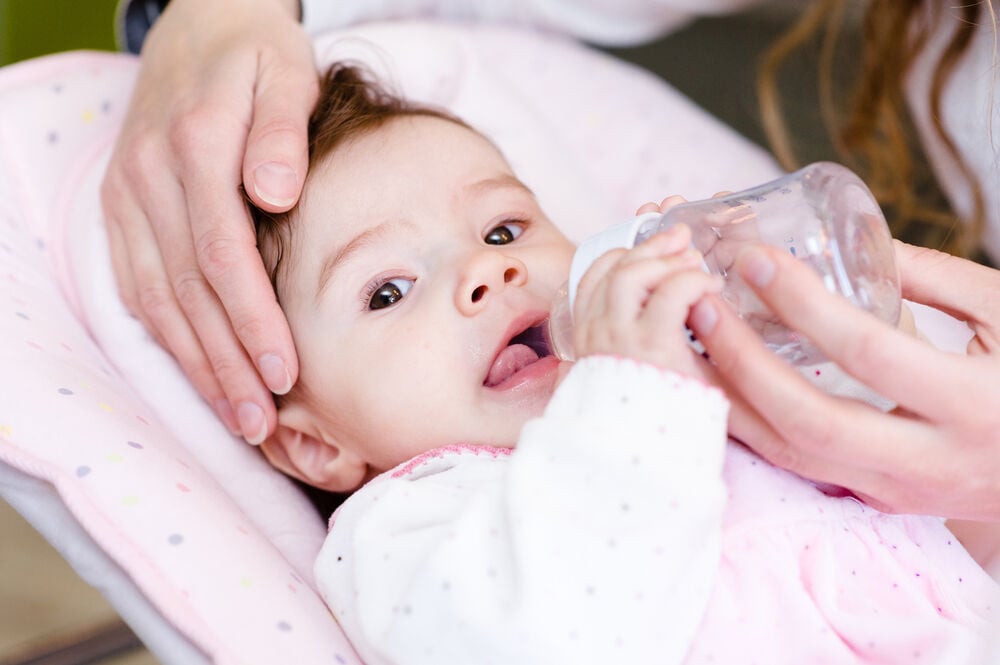After changing yellowish baby poop diapers for a while, you might think you've seen it all. But that couldn't be further from the truth. Baby poop color can vary from day to day. Even within the same day, the color of different bowel movements can change. Many parents start to worry when they notice these color changes. Read on to learn more about yellowish baby poop and what it means.
-
Tracking cycle
-
Getting pregnant
-
Pregnancy
-
Help Center
-
Flo for Partners
-
Anonymous Mode
-
Flo app reviews
-
Flo Premium New
-
Secret Chats New
-
Symptom Checker New
-
Your cycle
-
Health 360°
-
Getting pregnant
-
Pregnancy
-
Being a mom
-
LGBTQ+
-
Quizzes
-
Ovulation calculator
-
hCG calculator
-
Pregnancy test calculator
-
Menstrual cycle calculator
-
Period calculator
-
Implantation calculator
-
Pregnancy weeks to months calculator
-
Pregnancy due date calculator
-
IVF and FET due date calculator
-
Due date calculator by ultrasound
-
Medical Affairs
-
Science & Research
-
Pass It On Project New
-
Privacy Portal
-
Press Center
-
Flo Accuracy
-
Careers
-
Contact Us
What Does Yellowish Baby Poop Mean?


Every piece of content at Flo Health adheres to the highest editorial standards for language, style, and medical accuracy. To learn what we do to deliver the best health and lifestyle insights to you, check out our content review principles.
What causes yellow baby poop?
For a newborn, yellowish stool is considered to be normal and should not cause any concerns by itself.
Poop from breastfed babies is usually mustard-like. It’s yellow, light brown, or green in color; has a loose, somewhat watery consistency; and can be lumpy, pasty, creamy, curdy, or mushy. Unlike what you might expect, the smell is slightly sweet.
Babies who feed on formula usually have poop better-formed than poop from breastfed babies. The color ranges from pale yellow baby poop to brownish green, light brown, or yellowish brown. Its smell is similar to regular poop, though not as strong as the poop from a baby who has started eating solid foods.
Yellow watery diarrhea in babies
Diarrhea is among the most common diseases that afflict babies from time to time. It's usually the result of a short-term illness such as an infection or food poisoning. In some cases, though, an underlying medical condition may cause diarrhea.
Babies suffering from diarrhea lose a lot of body water, so it's important that you give them a lot of fluids to prevent the side effects of dehydration. In case a chronic condition is behind the baby’s diarrhea, your pediatrician can provide treatment. In any case, diarrhea in babies should be observed by a doctor.
Is yellow baby poop dangerous?
Sudden diarrhea that lasts about a couple of weeks is called acute diarrhea. If it lasts more than four weeks, it's considered chronic diarrhea. Depending on the reasons, diarrhea may be accompanied by other symptoms, such as abdominal pain, fatigue, vomiting, and fever.
If you notice prolonged and unusual color changes in your baby’s stool — especially tarry, black, or red stool — call the doctor immediately. Such a symptom is may be a sign of bleeding in the digestive system, and too much bleeding can result in potentially life-threatening health problems. However, it will be a good idea to contact your doctor and have a consultation about possible reasons for diarrhea.
If your baby is suffering from acute diarrhea, they should be fine in a few days. Meanwhile, give them enough liquids to ensure they remain well-hydrated and consider consulting a doctor.

You can ease your baby’s diarrhea with certain home remedies:
- Consider changing your baby’s diet with the help of your pediatrician.
- If the cause of your child’s diarrhea is an allergy to cow’s milk in baby formula, you can switch to a formula that doesn’t contain cow’s milk.
- Give your baby plenty of fluids to keep them well-hydrated.
- Adjust a mother’s diet if the baby is breastfed.
If these home remedies fail to work, your pediatrician might recommend over-the-counter antidiarrheal medication tailored for babies. Alternatively, the doctor may prescribe an antiparasitic to treat a parasitic infection or an antibiotic for a bacterial infection.
Infants who become dehydrated as a result of diarrhea need to be taken to the hospital to have fluid given to them intravenously.
In addition to that, the pediatrician might recommend reintroducing fluids in your baby's body through an oral rehydration solution. These products can be found at your drug store or the supermarket. They contain electrolytes and fluids that help prevent your baby from becoming dehydrated.
If you feed your infant solid foods, your pediatrician might recommend switching to a diet that contains bland, starchy foods such as rice cereal, and strained bananas. If you’re breastfeeding, you may also need to modify your own diet and stay away from foods and medication that are may potentially trigger diarrhea in your baby.
It is imperative that you avoid feeding your baby foods that may worsen diarrhea. These include:
- Food that contains a lot of fiber
- Greasy foods
- Sweets such as soda, cookies, or cake
- Dairy products including cheese and milk
Baby diarrhea caused by a bacterial or viral infection can be highly contagious. So make sure you wash your hands well using soap and warm water whenever you change your baby’s diaper. Doing so will help prevent spreading the infection from your baby to you or others. Moreover, maintain good hygiene in the diaper-changing area, keeping it disinfected and clean. Keep your child away from daycare until they're fully recovered.
Your baby’s poop can take on many different odors, colors, and textures depending on what you’re feeding them: formula, breast milk, or solid foods. Baby poop is much softer than that of adults, and it can often be softer than usual. However, if it turns yellow and watery, and occurs in large amounts and more frequently, it might be diarrhea.
Causes of diarrhea in babies include infections, food allergies, and food poisoning. Unchecked diarrhea can easily lead to dehydration in babies, which can be dangerous. Make sure you give the baby a lot of fluids, maintain good hygiene, feed them a proper diet, and consult a doctor to be sure that diarrhea is not caused by any medical condition.
Take a quiz
Find out what you can do with our Health Assistant


Hey, I'm Anique
I started using Flo app to track my period and ovulation because we wanted to have a baby.


The Flo app helped me learn about my body and spot ovulation signs during our conception journey.


I vividly
remember the day
that we switched
Flo into
Pregnancy Mode — it was
such a special
moment.
Real stories, real results
Learn how the Flo app became an amazing cheerleader for us on our conception journey.




